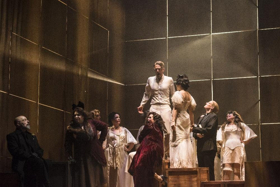Review: Boston Lyric Opera's THE THREEPENNY OPERA Is On The Money

The Threepenny Opera
Music by Kurt Weill, Libretto by Bertolt Brecht, English Translation by Michael Feingold, Original German text based on Elisabeth Hauptmann's German Translation of John Gay's The Beggar's Opera, Sung in English; Conductor, David Angus; Stage Director, James Darrah; Set Designer, Julia Noulin-Mérat; Costume Designer, Charles Neumann; Lighting Designer, Pablo Santiago; Wig & Makeup Designer, Jason Allen; Stage Manager, Becki Smith; Boston Lyric Opera Chorus, Michelle Alexander, Chorusmaster
CAST: Christopher Burchett, James Maddalena, Michelle Trainor, Kelly Kaduce, Daniel Belcher, Chelsea Basler, Renée Tatum, Vera Savage, Jaime Korkos, Heather Gallagher, Marie McCarville, Vanessa Schukis, Alisa Cassola, Jesse Darden, David Cushing, Andy Papas, Thomas Oesterling, Ryne Cherry, Ron Williams
Performances March 23 through March 25 by Boston Lyric Opera at Huntington Theatre, 264 Huntington Avenue, Boston, MA; Box Office 617-542-6772 or www.blo.org
The Threepenny Opera is a play with music that feels more like musical theater than opera, owing to the preponderance of scenes acted with dialogue (about 70%), versus only about 30% of the story told in song. Although rarely performed by a professional opera company, Boston Lyric Opera and Director James Darrah have brought together an ensemble of artists whose acting skills pair nicely with their stellar vocal talents to distinctively portray the cast of memorable characters. Written in 1928 by Bertolt Brecht with composer Kurt Weill, the play is set in Victorian London and satirizes the bourgeoisie of Weimar Germany, but this production leans heavily on the aesthetic of the 1920s and 1930s for its minimalist appearance.
Ninety years after its debut, The Threepenny Opera remains a timely cautionary tale when viewed through the lens of modernity. The forces of capitalism, socialism, communism, and fascism are battling for agency, if not supremacy. The opportunistic Mr. and Mrs. Peachum, their rebellious and bizarre daughter Polly, and the charismatic protagonist Macheath, aka Mack the Knife, are products of their time, but would all fit quite well into the reality-tv world we inhabit. Among the denizens of this seedy side of London, everything is a competition, even among the beggars, whores, and thieves. Money equals power at every level of society, spurring jealousy, blackmail, and trickery. In the shadow of the coronation of Queen Victoria, the low-lifes jockey to reign over their piece of the sovereign sod, doing whatever they can to eliminate their rivals and enemies.
The principals in the cast are Christopher Burchett (Macheath), a combination of danger and charm; Kelly Kaduce (Polly Peachum), humorous and daring to do the unexpected; James Maddalena (Mr. Peachum), power-hungry businessman; Michelle Trainor (Mrs. Peachum), oozing malevolence and the perfect helpmate to her husband; Daniel Belcher (Tiger Brown), the cop on the take and not as smart as he thinks; Chelsea Basler (Lucy), a spitfire willing to fight for her man; Renée Tatum (Jenny Diver), a self-assured woman who knows how to get what she wants. Across the board, the characters are brought to life and Weill's score is beautifully conveyed by these major players. David Angus conducts an eleven-piece chamber ensemble which plays the jazzy, German dance-influenced music with brio.
The chorus, under Chorusmaster Michelle Alexander, consists of: Alisa Cassola, Heather Gallagher, Jaime Korkos, Marie McCarville, Vera Savage, Vanessa Schukis, Ryne Cherry, David Cushing, Jesse Darden, Thomas Oesterling, Andy Papas, and Ron Williams. They also perform the roles of the whores, Macheath's gang, beggars, police officers, and a member of the clergy. The set (designer Julia Noulin-Mérat) gives the appearance of a big box, but its high, faux wood walls conceal many panels which slide open to allow characters to enter and exit. The lighting design (Pablo Santiago) often divides the stage into separate areas for different scenes, augmented by various overhead spots and slants of light. There is an almost constant presence of stage fog, conveying a surreal aura. Costume designer Charles Neumann employs a muted color palette, often made more vivid by colored tones of lighting. Jason Allen's wig and makeup designs spice up the characters more so than their styles of dress.
It has been said that the longevity and popularity of The Threepenny Opera is primarily due to the music. Although many people associate only with "Mack the Knife," other parts of the score may also sound familiar. In case you're wondering, BLO presents the show in English in order to make it accessible for the local audience. It is very much a story of its time, but this production makes it clear that it is also a story for our time.
Photo credit: Liza Voll Photography (Christopher Burchett and the cast of The Threepenny Opera)
Reader Reviews

Videos

